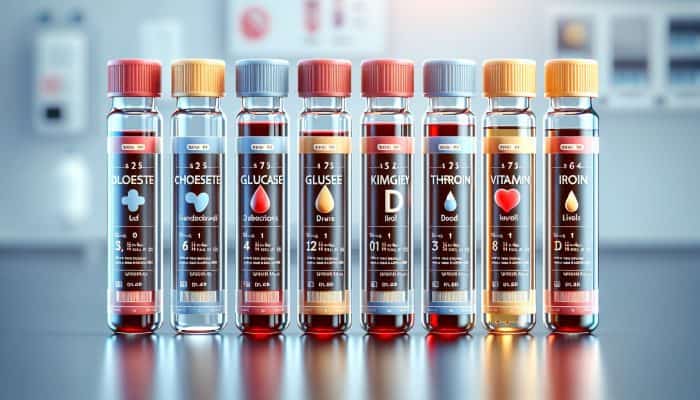Your Comprehensive Guide to Well-Person Blood Tests for Optimal Health
Understanding Well-Person Blood Tests: Unlocking Their Health Benefits

Well-person blood tests are vital health assessments aimed at pinpointing early signs of potential health disorders while providing a comprehensive overview of an individual's overall wellness. These essential screenings are fundamental components of preventative healthcare, allowing individuals to adopt proactive strategies to maintain their health. Typically, the tests included in a well-person blood test panel encompass several significant health markers, such as:
- Full blood count (FBC)
- Cholesterol levels
- Blood glucose levels
- Liver function tests
- Kidney function tests
- Thyroid function tests
- Vitamin D levels
- Iron studies
Together, these tests provide a detailed snapshot of an individual’s health condition, allowing for timely interventions if any irregularities are discovered.
Discover the Advantages of Regular Health Screenings for Your Well-Being
Participating in routine health screenings, such as well-person blood tests, brings numerous benefits, especially regarding the early detection and management of health issues. These screenings can greatly enhance health outcomes by identifying problems before they develop into serious conditions. The main advantages of regular health screenings encompass:
- Early identification of health issues
- Personalised health and lifestyle recommendations
- Informed decision-making regarding treatment options
- Enhanced management of existing health conditions
- Promotion of a proactive health approach
- Increased awareness of personal health risks
By prioritising regular health screenings, individuals can empower themselves to make informed choices, ultimately leading to a significantly improved quality of life.
How to Easily Access Well-Person Blood Tests in Borehamwood
For residents of Borehamwood, accessing well-person blood tests is both straightforward and convenient, thanks to the plethora of healthcare providers operating in the area. Individuals can easily locate services tailored to their specific health needs. Notable local healthcare providers offering these crucial tests include:
- Elstree and Borehamwood Health Centre
- Boots Pharmacy Health Clinics
- Local GP practices such as The Ridgeway Surgery
- Private health clinics that provide specialised testing
- Walk-in health clinics for urgent screening
- Pharmacies offering health check services
This range of options ensures that residents can select a provider that meets their preferences for both accessibility and quality of service.
Essential Preparations for Your Blood Test: A Step-by-Step Guide

Key Preparations to Ensure Optimal Accuracy Before Your Blood Test
Proper preparation for a blood test is critical to obtaining reliable results. Recommended steps usually include fasting for a specified time, staying adequately hydrated, and avoiding certain medications that may affect test outcomes. Generally, you should follow these guidelines:
- Fast for 8-12 hours before the test, especially for glucose and lipid evaluations
- Drink ample water to maintain optimal hydration
- Refrain from alcohol consumption for at least 24 hours leading up to the test
- Inform your healthcare provider about any medications or supplements you are currently taking
- Wear comfortable clothing to facilitate easy access to your arm during the blood draw
- Stay calm and relaxed prior to the test to help alleviate any anxiety
Adhering to these preparation steps not only aids in obtaining accurate results but also enhances your overall testing experience, making it a smoother process.
Debunking Common Myths About Blood Tests: What You Need to Know
Many individuals hold misconceptions about blood tests, often perceiving them as painful and unnecessary. In reality, these tests are typically quick and essential for ongoing health monitoring. It is vital to dispel these myths by highlighting the following points:
- Blood tests can be completed in just a few minutes
- Most individuals experience minimal discomfort, often described as a slight pinch
- Blood tests are crucial for revealing silent conditions
- They provide invaluable insights into your overall health
- Testing is a standard component of healthcare management, recommended for everyone
By understanding the true nature of blood tests, individuals can approach them with confidence rather than fear.
The Importance of Post-Test Care and Follow-Up for Your Health

Once a blood test has been completed, consulting with your healthcare provider to review the results and determine any necessary follow-up actions is crucial. This post-test phase is just as significant as the testing itself. Key steps to consider include:
- Scheduling a follow-up appointment to discuss your results
- Inquiring about any abnormal findings and their implications for your health
- Discussing lifestyle modifications or potential treatments based on your results
- Keeping a record of your results for future reference
- Maintaining open communication with your healthcare provider regarding any ongoing concerns
Taking these steps ensures that you remain well-informed and prepared to make decisions about your health based on the insights gained from your blood test.
What to Expect During Your Blood Test Procedure: A Clear Overview
Familiarising yourself with what to expect during your blood test can significantly reduce any anxiety associated with the procedure. Typically, the process is straightforward and involves a small needle prick. Generally, you will first be asked to sit comfortably, and a healthcare professional will then:
- Cleanse the area with an antiseptic solution
- Insert the needle into a vein, usually located in your arm
- Collect the necessary blood sample into sterile vials
- Apply pressure to the site once the blood is drawn
- Cover the area with a bandage after drawing blood
Being aware of this routine can help you mentally and emotionally prepare, making the overall experience more manageable.
Expert Perspectives on the Importance of Well-Person Blood Tests in Borehamwood
Transforming Health Management Through Early Detection
Early detection via well-person blood tests has proven to be instrumental in enhancing treatment outcomes. Residents of Borehamwood have significantly benefited from regular screenings that allow for timely identification of conditions such as diabetes and high cholesterol. A local case study exemplifies this, where a patient discovered elevated blood glucose levels through routine testing. This early detection facilitated lifestyle changes and the creation of an effective management plan, thereby preventing the progression to more severe health issues.
Such real-world examples underscore the necessity of engaging in regular health screenings and demonstrate the life-saving potential of early intervention.
Recommendations from Local Healthcare Professionals for Optimal Wellness
Healthcare professionals in Borehamwood consistently advocate for the importance of regular health check-ups, highlighting the need to establish a routine for well-person blood tests. Residents are encouraged to schedule their tests annually or as advised based on individual health risks. Actionable steps to consider include:
- Consulting your GP about your health history and any risk factors
- Utilising online booking systems to secure a convenient appointment
- Participating in local health awareness campaigns
- Setting reminders to ensure you don’t miss appointments
By heeding the advice of these professionals, residents can take proactive measures to maintain their health effectively.
Recent Research Highlighting the Benefits of Preventative Health Care
Recent studies have underscored the substantial advantages of preventative health measures, particularly through well-person blood tests. Research indicates that individuals who engage in regular health screenings experience markedly improved health outcomes compared to those who do not participate. Expert analysis reveals that preventative testing not only facilitates early disease detection but also aids in formulating personalised health strategies that can mitigate risks.
As research continues to evolve, remaining informed about the latest findings can empower individuals to embrace preventative care as a crucial aspect of their health journey.
Deciphering Your Test Results: A Detailed Guide
Insights from Your Blood Test Results: What They Reveal About Your Health
Interpreting blood test results can often be complex due to the variety of markers included. Each marker serves as a significant indicator of your overall health status. Key markers to focus on typically include:
- Glucose levels, which can indicate diabetes risk
- Cholesterol levels, reflecting cardiovascular health
- Haemoglobin levels, providing insights into blood health
- Liver enzymes, indicating liver function
- Vitamin levels, which can influence overall health
Understanding the implications of these results enables you to engage in informed discussions with your healthcare provider and take necessary actions based on your findings.
Normal Ranges: Understanding Their Relevance to Your Health
Each blood test comes with established normal ranges, which may vary between laboratories. Results outside these ranges may indicate underlying health issues. For instance, elevated cholesterol levels can suggest a risk for cardiovascular diseases, while low iron levels might signal anaemia. Engaging with your healthcare provider to accurately interpret these values is crucial for understanding their implications for your health.
Comprehending these measurements ensures that you remain proactive in effectively managing your health status.
When to Seek Further Medical Advice After Testing: Key Considerations
If your test results reveal abnormalities, it is imperative to consult a healthcare provider promptly. Recognising when to seek further medical advice can indeed be life-saving. For example, significantly elevated blood glucose levels may necessitate immediate action to prevent the onset of diabetes. Similarly, abnormal liver enzyme levels may require further investigation to rule out liver disease or dysfunction. Always trust your instincts and seek professional advice if you feel concerned based on your results.
How to Analyse Trends in Your Test Results Over Time
Monitoring changes in your test results over time can provide valuable insights into your health trajectory. For instance, a consistent elevation in cholesterol levels may indicate a need for lifestyle adjustments or further medical intervention. Tracking these trends allows both you and your healthcare provider to evaluate the effectiveness of any lifestyle changes or treatments you may be undergoing. This ongoing dialogue enhances the quality of care you receive and fosters a deeper understanding of your health.
Factors Influencing Your Test Results: What You Should Know
Several factors can impact blood test outcomes, including your diet, medications, and lifestyle choices. For example, consuming a high-fat meal prior to a cholesterol test can lead to inaccurate results. Likewise, specific medications can affect liver function tests. Therefore, it is essential to communicate openly with your healthcare provider about your lifestyle and any substances you may have consumed before testing. This transparency ensures that your results are interpreted accurately and allows for appropriate recommendations.
Realising the Benefits of Well-Person Blood Tests
How Early Disease Detection Can Dramatically Improve Health Outcomes
Well-person blood tests play a pivotal role in identifying diseases at an early stage, which significantly enhances treatment success rates. For instance, the early detection of conditions like diabetes enables timely interventions that can prevent serious complications such as heart disease or neuropathy. Individuals who undergo regular testing are more likely to stay informed about their health status and can make necessary adjustments to their lifestyle, thereby improving their long-term health outlook.
The Critical Importance of Continuous Health Monitoring
Regular blood tests serve as an indispensable tool for monitoring your health over time. They provide a baseline for comparison, enabling you and your healthcare provider to track changes and make informed decisions regarding lifestyle adjustments or medications. For instance, if test results indicate rising cholesterol levels, proactive measures can be taken to address this before it escalates into a more serious issue.
Finding Peace of Mind Through Consistent Health Testing
Routine testing contributes to peace of mind by offering clarity regarding your health status. Knowing your health numbers can significantly alleviate anxiety surrounding potential health issues. This assurance enables individuals to focus on their daily lives without the constant worry of unmonitored health risks. Engaging in regular health screenings empowers individuals to take control of their health, paving the way for a healthier and more confident future.
Effortless Access to Well-Person Blood Tests in Borehamwood
Simple Appointment Booking for Your Blood Test
Booking a well-person blood test in Borehamwood is a straightforward process that can be accomplished through local clinics or online platforms. Many healthcare providers offer user-friendly online booking systems, allowing you to select an appointment time that best fits your schedule. It is advisable to check the clinic’s website or contact them directly to confirm their availability and any specific requirements for the appointment. This convenience ensures that residents can seamlessly integrate health screenings into their lives.
Understanding the Costs and Insurance Coverage for Blood Tests
Being informed about the costs associated with well-person blood tests is crucial for effective financial planning. Generally, these tests can vary significantly in price, often depending on the specific tests performed and the provider. Many health insurance plans cover routine blood tests; however, it is essential to verify with your insurance provider regarding specifics of coverage and any potential out-of-pocket expenses. Familiarising yourself with the costs allows for better financial planning when seeking these essential health services.
Utilising Walk-In Clinics and Testing Centres for Maximum Convenience
Borehamwood features several walk-in clinics and testing centres where residents can obtain well-person blood tests without the need for an appointment. These convenient facilities provide a flexible option for those with busy schedules or urgent health concerns. Notable locations include local pharmacies and health centres that provide quick access to testing services. This accessibility increases the likelihood that residents will prioritise their health by taking advantage of readily available resources.
Essential Preparation and Fasting Guidelines for Your Blood Test
Preparation for a well-person blood test in Borehamwood typically involves specific fasting requirements to ensure the accuracy of the results. Most providers recommend fasting for 8-12 hours prior to the test, especially for glucose and lipid panels. Staying hydrated by drinking water is highly encouraged. Understanding these requirements is essential to ensure that your test results accurately reflect your true health status and assist healthcare providers in making informed decisions.
Research-Based Insights Into the Benefits of Well-Person Blood Tests in Borehamwood
Significant Studies on Health Outcomes and Their Key Findings
Research indicates that regular well-person blood tests correlate with improved health outcomes for residents in Borehamwood. A substantial study highlighted that individuals who participated in routine screenings exhibited lower rates of chronic disease and enhanced management of pre-existing conditions. Real-world examples of residents benefiting from early detection and subsequent intervention illustrate how these practices can lead to healthier communities. The emphasis on preventative care through routine testing empowers individuals to take charge of their health, resulting in a more informed population.
The Positive Impact of Well-Person Blood Tests on Public Health
Well-person blood tests contribute positively to public health by alleviating the burden of chronic diseases within the community. When individuals engage in regular health screenings, it not only benefits their personal health but also fosters a healthier society overall. Community initiatives that promote awareness and access to routine testing can significantly decrease the prevalence of conditions such as diabetes and hypertension. Encouraging widespread participation in well-person blood tests can lead to collective improvements in health metrics and reduced healthcare costs.
The Long-Term Advantages of Embracing Preventative Health Care
Adopting preventative care through well-person blood tests offers substantial long-term health benefits. These tests can help identify potential health issues before they develop into more severe conditions, ultimately minimising healthcare costs and enhancing quality of life. By investing in preventative measures, individuals can make informed lifestyle choices that contribute to their overall well-being. This proactive approach fosters a culture of health and wellness that extends beyond individual patients to positively impact the community at large.
Making Informed Lifestyle Changes After Your Blood Test Results
Implementing Dietary Changes Based on Your Blood Test Results
Upon receiving your blood test results, they may indicate necessary dietary adjustments to enhance your overall health. For example, if your glucose levels are above normal, it may lead to recommendations for reducing sugar intake and increasing fibre-rich foods. Conversely, elevated cholesterol levels might prompt suggestions for incorporating more heart-healthy foods, such as omega-3 fatty acids. Adjusting your diet based on test outcomes not only improves your health but also empowers you to make choices that align with your wellness objectives.
Exercise Recommendations Tailored to Your Blood Test Findings
Depending on your test results, increasing physical activity can be highly beneficial for your health. If cholesterol or weight levels are a concern, your healthcare provider may recommend a personalised exercise regimen. Activities such as brisk walking, cycling, or swimming can significantly enhance cardiovascular health and aid in weight management. Establishing a regular exercise routine, guided by professional advice, is key to maintaining good health and boosting overall well-being.
Emphasising Stress Management and Mental Health After Testing
Following your blood test, it is vital to concentrate on stress management and mental health, especially given the potential anxieties surrounding health concerns. Incorporating stress-relief techniques such as mindfulness, yoga, or meditation can greatly enhance your mental well-being. Engaging in hobbies, spending quality time with loved ones, and ensuring adequate rest are also crucial components of maintaining a balanced lifestyle. By prioritising mental health, you can cultivate resilience and a proactive mindset towards your overall health journey.
Commonly Asked Questions About Well-Person Blood Tests
What is the purpose of a well-person blood test?
A well-person blood test is a comprehensive health screening that identifies early signs of health conditions and monitors overall wellness through various blood markers.
How frequently should I undergo a well-person blood test?
It is generally recommended to have a well-person blood test annually or as advised by your healthcare provider based on your individual health risks.
Is fasting required before a well-person blood test?
Yes, fasting for 8-12 hours is often necessary for specific tests like glucose and lipid panels to ensure accurate results.
What should I expect during the blood test procedure?
During the blood test, a healthcare professional will insert a small needle into a vein, typically in your arm, to collect a blood sample. The procedure is usually quick and involves minimal discomfort.
How long does it typically take to receive test results?
Test results usually take a few days to a week to process, depending on the specific tests performed and the healthcare provider.
What steps should I take if my test results are abnormal?
If your test results are abnormal, it is essential to consult your healthcare provider promptly to discuss the implications and potential next steps.
Are there any risks associated with blood tests?
Blood tests are generally safe; however, some individuals may experience mild bruising or discomfort at the site of the needle insertion.
Can I get a well-person blood test without a referral?
In most cases, you can access well-person blood tests without a referral, especially at walk-in clinics and pharmacies that offer health services.
What costs are associated with well-person blood tests?
Costs can vary, but many health insurance plans cover routine tests. It is best to check with your provider for specifics regarding coverage.
How do I prepare for a well-person blood test?
Preparation typically includes fasting if required, staying hydrated, and informing your healthcare provider about any medications you are taking to ensure accurate results.
Connect with us on Facebook!
This Article Was First Found On https://bloodtest.co.uk
The Article Blood Test for Wellness in Borehamwood: A Health Checkup Was Found On https://limitsofstrategy.com

